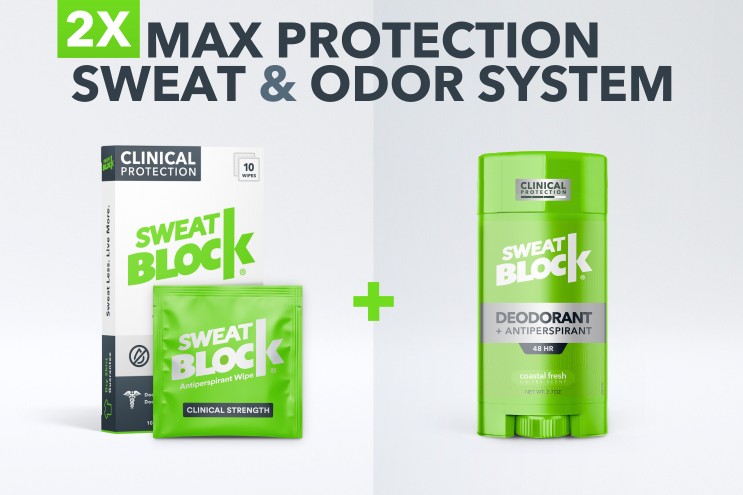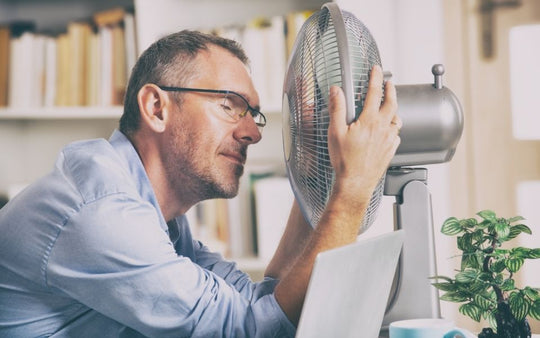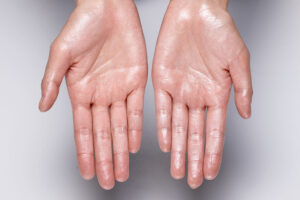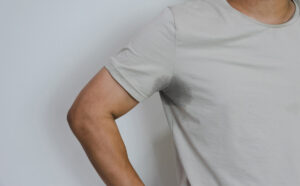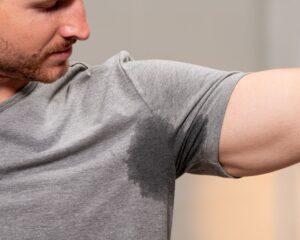WHY DO I SWEAT SO MUCH? : ARTICLE CONTENTS
Sweating a lot? … when you workout, sleep, after eating, or for no reason at all?
Wondering, why do I sweat so much even when I’m just chilling?
You’re not alone. Many experience bouts of unexplained, excessive sweating.
Everyone sweats; It’s normal, it’s healthy, and it’s a sign our eccrine sweat glands are doing their job, helping our body’s complex cooling system. Without the ability to produce sweat, we’d be at a constant threat of heatstroke, making fevers terrifying.
BUT… for some, it’s more than just the usual. They experience excessive sweating hyperhidrosis which can be classified into primary hyperhidrosis and secondary hyperhidrosis.
When normal sweat turns to excessive sweating – it’s extremely annoying. It’s uncomfortable, embarrassing, can lead to skin irritation, and can leave you feeling anxious and isolated.
Are you sweating too much? Is there something you can do to tame that extra sweat?
Let’s find out what might be causing your excess sweating…
Why do we sweat?
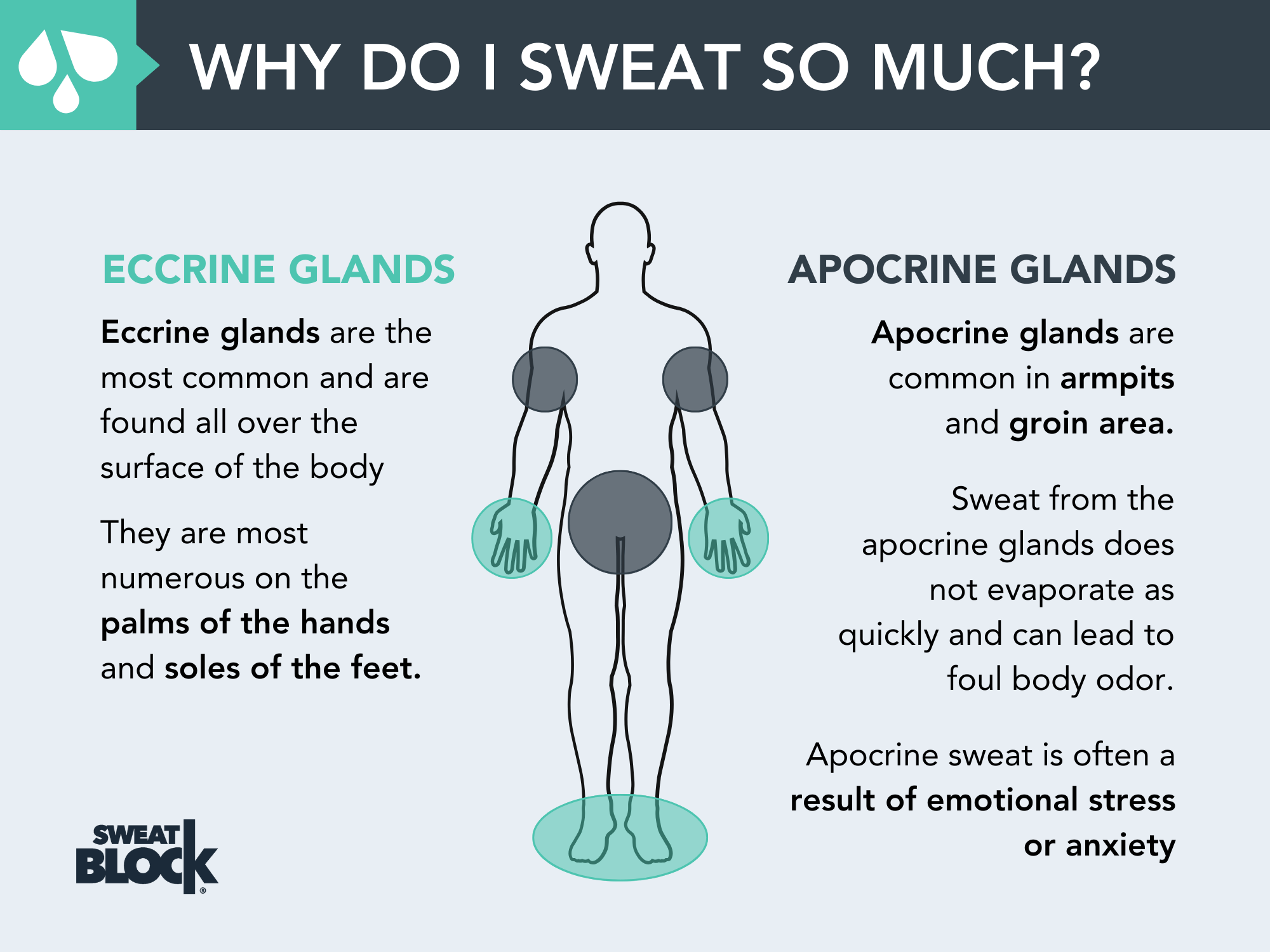
Without getting into the nitty-gritty of sweat science, sweating is part of your incredible internal cooling system.
When your body gets too hot due to exercise, external heat or stress, it releases that extra heat via sweat on your skin. Your body expels the extra heat as the sweat evaporates into the air.
Every person has anywhere from 2-4 million sweat glands. There are 2 main types of sweat glands; Eccrine and Apocrine.
Eccrine glands are the most common and are found all over the surface of the body. They are most numerous on the palms of the hands and soles of the feet.
Apocrine sweat glands are common in the armpits and groin area.
Sweat glands become completely activated during puberty. Surprisingly, women have more sweat glands than men, but on average, men sweat 40% more than women (queue the jokes and sweeping generalizations (☺).
How much do most people sweat?
Another question as popular as “Why do I sweat so much?” is “How much do most people sweat?”
According to The Essentials of Exercise Physiology, third edition, the average person sweats between 500-700 mL per day (2-3 cups) during regular daily activity.
Since a lot of sweat evaporates — and carrying around a vial to collect and measure the dripping sweat would be ridiculous — how do you know how much you’re sweating and if you’re sweating more than you should be?
How much sweat is too much?
Experts agree that if you suffer from excess sweating, you probably already know it.
"It's very difficult to quantify, but most people really do understand when they are sweating too much,” says Dee Anna Glaser, MD, president of the International Hyperhidrosis Society, and a professor of dermatology at St. Louis University.
Eric Schweiger, MD, dermatologist and clinical instructor of dermatology at Mt. Sinai School of Medicine, New York, agrees, saying, "Pretty much anyone who comes to me [complaining of] excess sweating has it...If you think you are sweating more than everyone else, or more than you used to, there is probably an issue going on.”
While we are on the topic of sweat…
Common Signs Of Excessive Sweating Include:
- You frequently sweat through your clothes.
- You’re self-conscious and reluctant with physical contact because you’re afraid of being sweaty or stinky.
- You spend lots of time during the day dealing with sweat (i.e., changing clothes, wiping yourself down, or putting pads or napkins under your arms).
- Your clothing choices revolve around items that will conceal sweat, like dark clothing, layers, etc.
- You sweat even when you’re not exercising or nervous. The weather doesn’t have to be hot, either.
- You seem more susceptible to skin infections.
- You have at least one weekly sweating episode.
- You have some family members that seem to sweat a lot, too.
Clinically, excessive sweating is called hyperhidrosis. People with hyperhidrosis sweat approximately five times more than their peers. It affects 4.8% of the U.S. population, or around 15.3 million people, though it’s likely more because many sufferers don’t seek treatment.
If after wondering “Why am I sweating so much?” or “Why do I sweat so easily” you just “web-diagnosed” yourself with hyperhidrosis, you’re probably wondering two things:
- What causes hyperhidrosis?
- And, can I fix it?
Understanding Hyperhidrosis
There are two basic types of hyperhidrosis. There’s primary focal hyperhidrosis, and then there’s secondary generalized hyperhidrosis (also called diaphoresis).
Focal hyperhidrosis generally appears in adolescence or early adulthood, and typically, you’d sweat profusely in one area or a few specific areas (like your feet, hands, face, or armpits). On the other hand, generalized hyperhidrosis affects the entire body, or large areas (like the whole back, abdomen, arms, or legs).
Unlike focal hyperhidrosis, generalized hyperhidrosis can appear at any point in your life. It’s more of a spontaneous onset of excess sweating versus a lifelong condition.
Now, the difference between the two is that focal hyperhidrosis is the disorder. It’s not usually a result of some underlying cause. Conversely, generalized hyperhidrosis usually has an underlying cause.
To put it simply…
Focal Hyperhidrosis
You’ve had it since you were a teenager, and it affects a specific area. There’s likely no underlying disorder or disease.
Generalized Hyperhidrosis
It came in like a wrecking ball, and it affects your whole body (or substantial portions of it). It’s probably caused by something else.
If either of the scenarios above feels familiar, you might want to talk with your doctor about hyperhidrosis. Your doctor can help you determine if you are sweating too much, if it’s general or focal hyperhidrosis, and what possible treatments are available to you.
7 Common Causes of Excessive Sweating
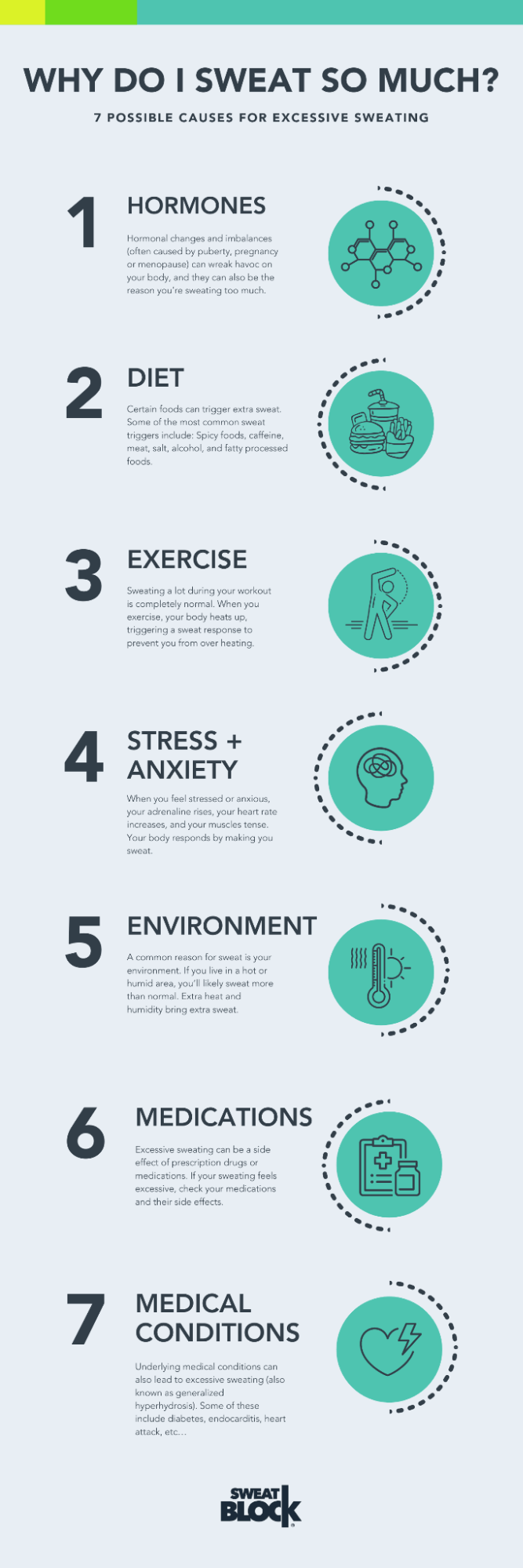
1. Hormones (Menopause, Pregnancy, Puberty)
Hormonal changes and imbalances can wreak havoc on your body, and they can also be the reason you keep asking yourself why you sweat so much.
80% of women will experience hot flashes during menopause, and at least 35% will experience them during pregnancy.
Younger women can also experience hot flashes during PMS or their regular monthly cycle. This occurs due to rising progesterone levels (which increase body heat) and decreasing estrogen levels (which can affect your hypothalamus, the part in your brain that regulates body temperature).
Those hot flashes lead to, you guessed it, sweat. Women aren’t alone, though. Recent studies suggest that low testosterone levels in men can also cause hot flashes and excess sweating. Most of the time, hormone-related hot flashes happen at nighttime.
Also, while we’re talking about hormones, if you’re currently going through puberty and sweating more than usual, constantly wondering “Why do I sweat so easily?”, it could just be the influx of hormones and all your sweat glands activating.
2. Food
Several foods cause sweating. Spicy foods, caffeine, meat, salt, alcohol, and fatty processed foods can all make you sweat. Each food has its own reason for making you sweat. For instance, spicy foods contain a chemical called Capsaicin that tricks your body into thinking that you’ve been exposed to heat.
Caffeine activates your central nervous system, raising your blood pressure and increasing your heart rate, which can cause you to sweat.
If you notice an increase in perspiration every time you eat or drink a particular food or beverage, sorry to tell you, it’s probably that food.
However, if you find yourself sweating every time you eat, no matter what you’re munching on, there could be something else going on. Gustatory hyperhidrosis, or Frey’s Syndrome, causes sweating while eating, and sometimes even while you’re just thinking about food. Diabetes can also cause you to sweat when you eat.
3. Exercise (and Weight)
Sweating a lot during your workout is completely normal. If you’re asking yourself, “Why do I sweat so much and so easily when I exercise?” The answer is usually pretty simple. You’re hot. No, we aren’t complimenting your physique; you’re literally hot. When you exercise, your body heats up, triggering a sweat response.
Research suggests that if you’re in great shape, you might actually sweat quicker and more abundantly than your less fit counterparts. But, being out of shape can also cause you to sweat more as you have to exert a lot of energy. So you get hotter, faster.
Your genetics and current hydration levels can also impact how much you sweat while working on your fitness.
While we’re on exercise, it’s worth mentioning that your current weight might also be impacting your sweat levels.
Lindsey Bordone, a dermatologist at Columbia Doctors, says, “The most frequent cause [of hyperhidrosis] is obesity because it takes extra work and effort to move when severely overweight.”
Dr. Carolyn Dean, of the Nutritional Magnesium Association, agrees that your weight might be what’s causing the extra sweat, saying, “The core temperature of obese people is higher because fat acts as an insulator, so they sweat more to try to cool down.”
4. Emotional Distress (Stress, Anxiety)
There’s a difference between heat-induced sweating and stress sweat. Not only does emotional sweat smell different, but it’s also caused by a totally different mechanism. Regular sweat (like you have at the gym) comes from the eccrine glands, which cover most of the body.
Stress sweat is secreted from the apocrine glands, which are found where hair follicles exist (armpits, scalp, and groin).
When you feel stressed or anxious, your body goes into a sort of fight-or-flight mode. Your adrenaline rises, your body releases stress hormones (like cortisol), your heart rate increases, and your muscles tense. Your body responds by making you sweat.
If you have high levels of stress or an anxiety disorder, this could be the culprit for your sweating.
5. Environment
This one might be a bit obvious, but if you live in a hot or humid area, your sweat could be a byproduct of your environment. Remember the whole thing about evaporation? In high humidity, your body’s natural cooling system can’t work effectively. The moisture in the air keeps the sweat on your body from evaporating.
If you’ve recently moved to a hotter area and your sweat increased at the same time, it’s the weather, friend. While we’re in the environment, since stress and anxiety can trigger excessive sweating, a toxic and stressful atmosphere might also be causing your sweating problem.
6. Medications
Medications are a necessary reality for many people. If you wonder “why do I sweat so much” but take any medicines (prescribed or herbal), do a deep dive on the side effects. The average prescription drug has an astonishing 70 side effects, so check those inserts, and make sure your meds aren’t what’s causing the issue.
7. Medical Conditions
Several medical conditions can cause excess sweating. These are the underlying conditions responsible for generalized hyperhidrosis. Some of these conditions include:
a. Diabetes
b. Endocarditis
c. Heat Exhaustion
d. Fever
e. Heart Attack
f. HIV/AIDs
g. Hyperthyroidism
h. Malaria
If you’re experiencing any other symptoms besides sweating, or if your excess sweat comes out of the blue, and none of the other causes for excess sweat are ringing true, you might have something more serious going on. We highly recommend a trip to the doctor.
How do I stop sweating so much?
Alright, so now you’re probably moving from “why do I sweat so much?” to like, “Okay, but how do I fix it…and why me?” We’re not going to leave you high, but we want to leave you dry. Eh? Come on; dad jokes make everything better. You probably already know the “sweat basics,” like wearing clean and loose-fitting clothing, showering regularly, keeping towels around to dry yourself off, and keeping the temperature as cool as possible.
All of these “solutions” are more like band-aids, though. They don’t stop sweating. They’re more like sweat management.
Let’s get real. You don’t want to know how to manage it. You want to know how to stop it.
There are several ways to stop excessive sweating, so you aren’t doomed to an eternity of sweat. Unfortunately, there isn’t one single solution guaranteed to work for every person. Your remedy will depend on what’s causing your sweat.
To identify the best answer to “Why do I sweat so easily”, first, identify the cause. Start by figuring out if you have focal hyperhidrosis or generalized hyperhidrosis. If it’s generalized, try to nail down why it’s happening. If possible, remove the root issue.
For instance, if it’s the food you’re eating, change your diet.
If it’s stress, work on finding your Zen.
If it’s a medication you’re on, see if there’s an alternative prescription to try.
If you’re dealing with hormones, medical conditions, or focal hyperhidrosis (where there’s no identifiable sweat trigger), there are several treatment options available…
Excessive sweating treatments
Some of the popular treatments for hyperhidrosis include:
- Prescription and Clinical Strength Antiperspirants – Formulated to be stronger than your average deodorant or antiperspirant from the grocery store shelf. Some are only available with a doctor’s prescription.
- Iontophoresis – An effective hyperhidrosis treatment for hands, feet, and face.
- Laser treatments – For underarm sweat.
- MiraDry – For underarm sweating.
- Botox Injections – For face, hands, feet, armpits, head, and any other body areas.
- Topical Prescription Medications like the Qbrexza Wipe.
- Oral Medications (also prescribed) – These treatments are the best option for patients with certain types of hyperhidrosis, such as facial sweating and generalized hyperhidrosis, and for those who had tried other therapies with no success.
- Hyperhidrosis Surgery – Typically reserved as a last resort. Sweat Gland Removal and Endoscopic Thoracic Sympathectomy (ETS) are two types of hyperhidrosis surgery. While these surgeries can effectively treat excessive sweat, they are permanent and come with other risks.
Wrapping up… the more information you have, the better chance you have of solving your sweat problem— and the less you’ll be asking yourself “Why do I sweat so much?”. Read more of our sweat articles, check in with your doctor, learn about your body, your diet, your stress triggers. Arming yourself with information can be one of the best defenses against excessive sweating.
Is your deodorant letting you down?
Sources
- 1 – https://medlineplus.gov/ency/article/003218.htm
- 2 – https://engineering.mit.edu/engage/ask-an-engineer/why-do-we-sweat-more-in-high-humidity/
- 3 – https://books.google.com/books?id=L4aZIDbmV3oC
- 4 – https://www.sweathelp.org/about-hyperhidrosis/epidemiology-of-primary-hyperhidrosis.html
- 5 – https://www.health.harvard.edu/blog/menopause-related-hot-flashes-night-sweats-can-last-years-201502237745
- 6 – https://www.ncbi.nlm.nih.gov/pmc/articles/PMC4167790/
- 7 – https://www.health.harvard.edu/newsletter_article/Hot-flashes-in-men-An-update
- 8 – https://www.webmd.com/drug-medication/news/20110527/drug-label-overload%231
- 9 – https://www.sweathelp.org/pdf/Diaphoretic_Diseases.pdf
- 10 – https://www.aad.org/diseases/a-z/hyperhidrosis-treatment
- 11 – https://www.sweathelp.org/sweatsolutions-newsletter/news-blog/372-new-research-hyperhidrosis-more-common-severe-and-socially-crippling-than-scientists-realized.html
You might also like...
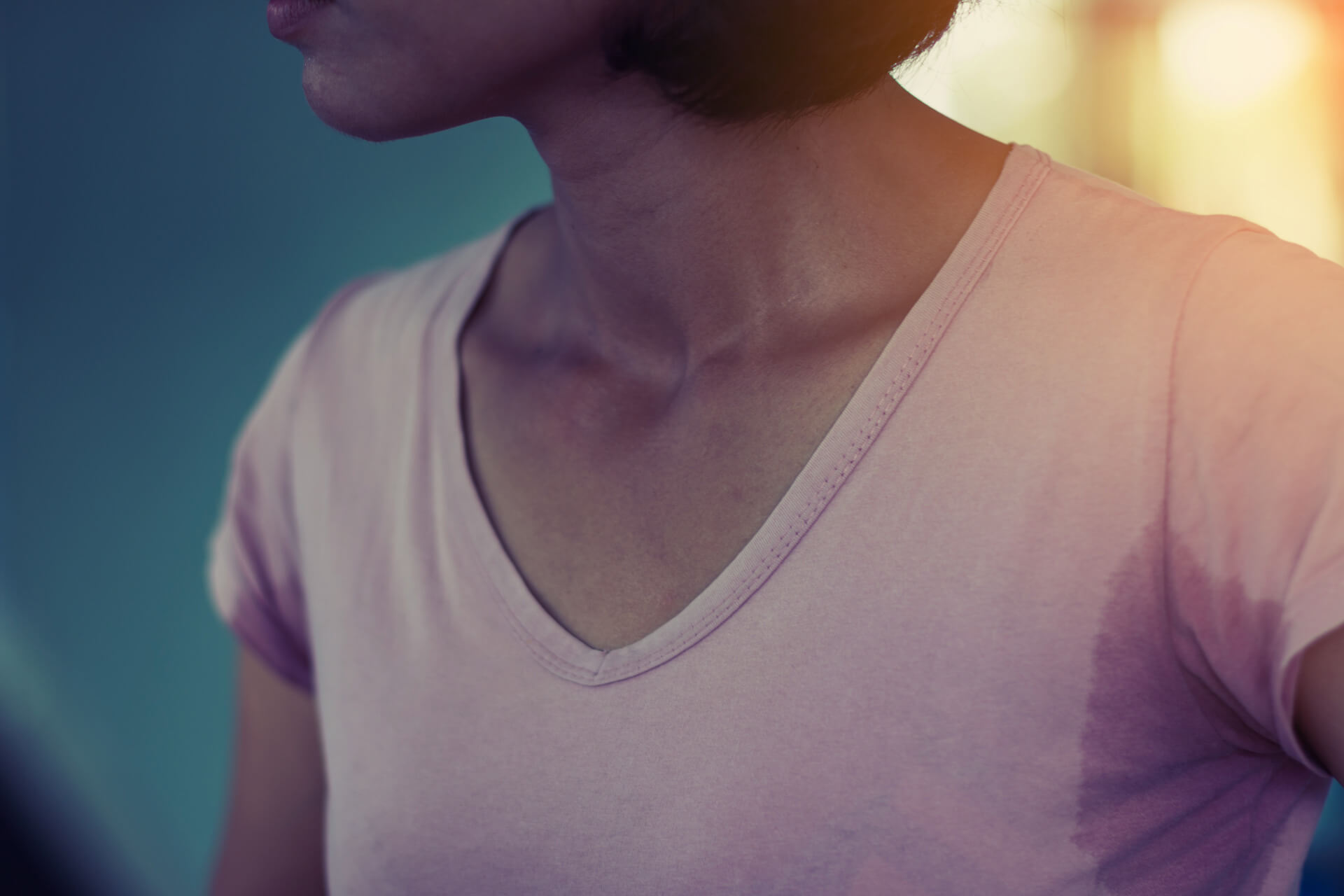
What is Focal Hyperhidrosis? Symptoms, Treatments, & Tips for Managing It Successfully
Table of Contents Does excessive sweating bother you? Keep you from being social? Or make you feel like you can’t
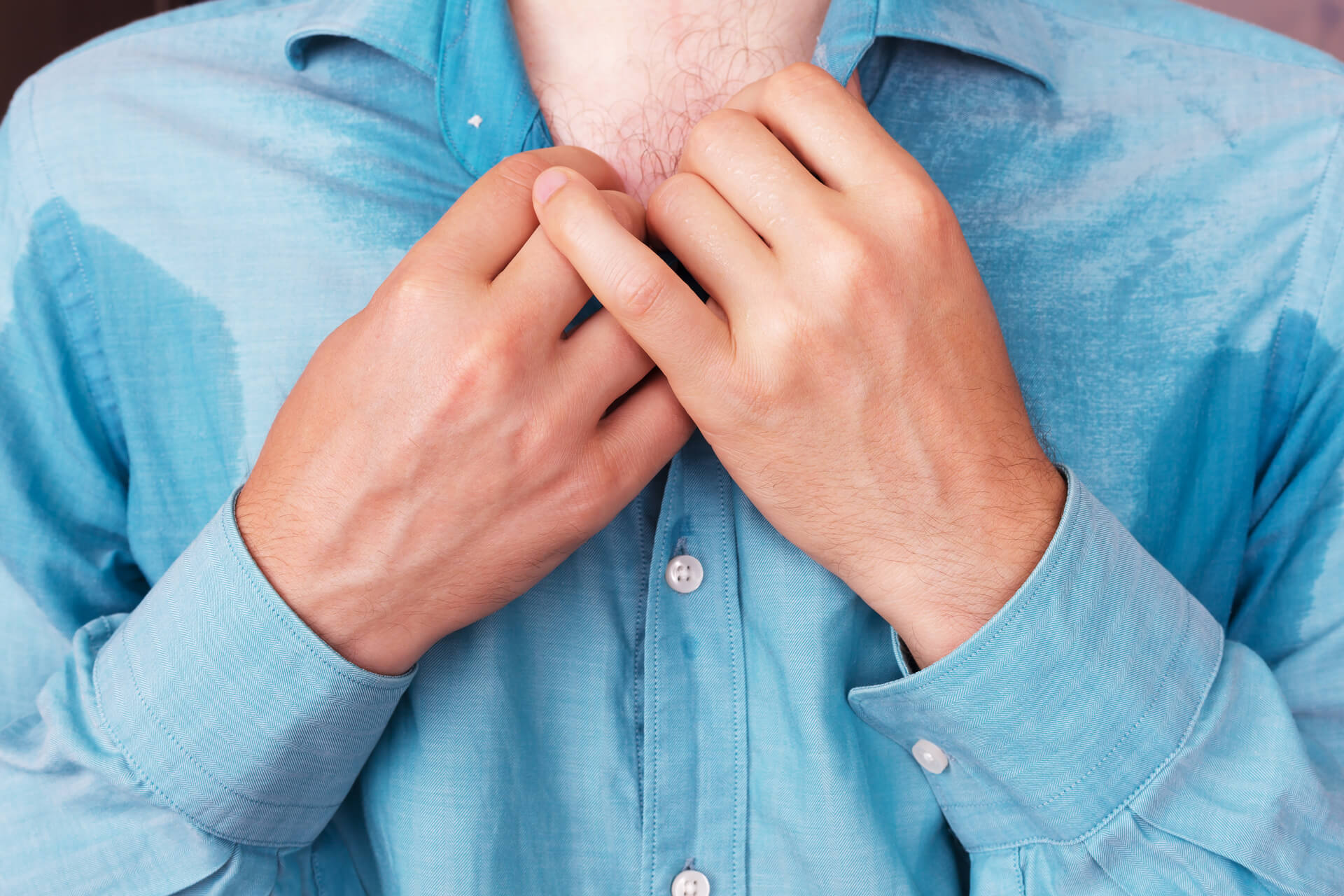
Is There a Hyperhidrosis Cure? 11 Hyperhidrosis Treatment Options
If you’re one of the roughly 8 million Americans who deal with excessive sweating (also known as hyperhidrosis), this article

How to Stop Sweating So Much? 9 Tips to Beat Unwanted Sweat
If you’ve ever suffered through an awkward sweaty hug, a slippery handshake, or a sweat-soaked job interview — this article

